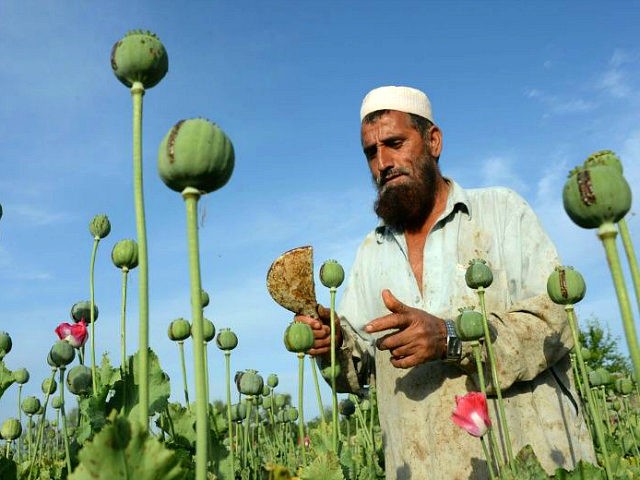The U.S. military, perhaps inadvertently, may have eradicated opium poppy crops when it dropped the “mother of all bombs” on Islamic State (ISIS/ISIL) jihadists in the Achin district of Nangarhar province in eastern Afghanistan.
Nangarhar province, located along the Pakistan border, is one of the top poppy-producing areas in Afghanistan, the world’s leading supplier of opium and its heroin derivative, according to the United Nations.
Meanwhile, Achin is one of the main opium-producing districts within Nangarhar.
The U.S. military identified Nangarhar as ISIS’s stronghold in the Afghanistan-Pakistan region soon after the jihadist group established its branch there, dubbed Khorasan Province, back in January 2015.
According to the latest U.N. estimate available for opium production in Achin, there were 1,090 hectares (ha), or about 4 square miles, under poppy cultivation there in 2015, making the area one of the top opium-producing districts in Nangarhar.
In 2016, the U.S.-backed authorities carried out virtually zero opium eradication operations in Nangarhar, in part due to the deteriorating security conditions in the province, primarily at the hands of ISIS.
That means farmers in Achin were likely able to keep growing opium last year in the 1,090 hectares identified in 2015.
In fact, the area under cultivation in all of Nangarhar increased by more than 40 percent in 2016, from 10,016 ha (about 37 square miles) to 14,344 (about 55 square miles), reported the U.N. without providing a breakdown by district.
The Pentagon and the U.S. military in Afghanistan did not immediately respond to Breitbart News’s requests for comment on the possible impact the massive bomb strike had on opium production in Nangarhar.
Officially known as the GBU-43/B Massive Ordnance Air Blast bomb (MOAB), the 21,600-pound bomb reportedly has the capability of demolishing everything within 1 square mile.
On Thursday, the U.S. military dropped the MOAB munition on a network of fortified underground tunnels in Achin district that terrorist group had been using to stage attacks on U.S.-backed Afghan forces and freely move back and forth across the Afghanistan-Pakistan border.
“US and Afghan forces had been unable to advance [in Achin] because ISIS — which has expanded into Afghanistan in recent years — had mined the area with explosives,” notes CNN.
The Pentagon has said the majority of ISIS fighters in the region are Pashtuns from Pakistan, former members of the Pakistani Taliban or Tehreek-e-Taliban Pakistan (TTP).
At least 36 ISIS jihadists were killed in the blast.
Achin lies right on the international boundary between Afghanistan and Pakistan.
Besides the movement of fighters, it is unclear whether the tunnels were facilitating other illegal cross-border activity on behalf of ISIS, particularly the movement of contraband such as weapons and opium.
Heroin from the Afghanistan-Pakistan region is smuggled into Europe and the United states through West Africa, home to ISIS’s West Africa Province and Boko Haram affiliate, reported the U.N.
The United Nations has linked Boko Haram to drug trafficking in West Africa.
American Gen. John Nicholson, the top commander of U.S. and NATO forces in Afghanistan, estimated late last year that the Taliban generates nearly 60 percent of its funding from the lucrative opium business.
The Taliban is believed to make millions from cultivating and trafficking the deadly drug, responsible for an overdose epidemic in the United States.
In an interview with Turkey’s state-run Anadolu Agency in December 2016, Zamir Kabulov, Russian President Vladimir Putin’s special envoy to Afghanistan, indicated that the Taliban is intent on spreading the evils of heroin on American soil.
“We will send this haram [forbidden by Islamic law] thing to the crusaders and make money out of that for the sake of the Muslim people,” Kabulov cited as the Taliban’s position on trafficking heroin into the U.S.
Some experts believe ISIS has tapped into the illegal opium enterprise.
The group’s stronghold in Afghanistan, particularly Achin district, being among the top opium-producing regions in the country supports that claim.
Russia’s Federal Drug Control Service (FSKN) predicted in 2015 that the terrorist group would generate billions in profits from trafficking opium.
Breitbart London learned from top terrorism experts that ISIS planned “to flood” the United Kingdom and other countries in Europe with heroin from Afghanistan.
ISIS is expected to adapt to the imminent collapse of its so-called caliphate in Iraq and Syria, in part, by continuing to expand its drug trafficking operations, suggested Joseph Micallef, a best-selling world affairs author, in a recent op-ed.
A 2016 report from the U.N. was unable to determine the extent to which ISIS is involved in drug trafficking.

COMMENTS
Please let us know if you're having issues with commenting.